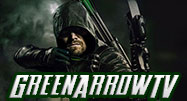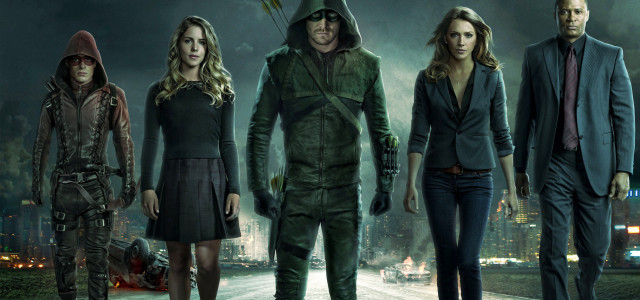
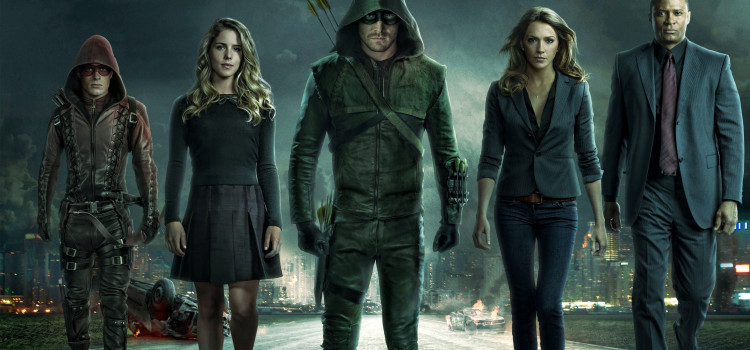
Team GATV Roundtable: Looking Back At Season 3
Opinion September 15, 2015 Craig Byrne

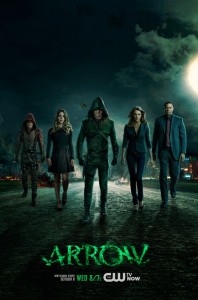 You didn’t think we’d go through the summer without another Team GATV Roundtable, did you?
You didn’t think we’d go through the summer without another Team GATV Roundtable, did you?
For those of you who are new to the site, the Team GATV Roundtable is where we look back at what’s been going on with Arrow, and look forward to the future and what’s coming up in the next season. Opinions are our own, and we try to have multiple folks participating so it doesn’t look one-sided.
Participating in this year’s roundtable? Matt Tucker, who recaps and reviews Arrow on a weekly basis around here; Derek B. Gayle, our resident reviewer at FlashTVNews who also writes about Power Rangers and other things at KSiteTV; GATV webmaster Craig Byrne; and GATV contributor and KSiteTV reviewer Stephanie Hall. We also have a special guest joining us from another site: Laurel Brown, editor and webmaster at DocBrownTV.com (go by her site and say hi!) Arrow Season 3 had a mixed reaction from the fan base and hopefully, multiple perspectives are shared within.
Today, we’re going to look back at Season 3; later this week, join us as we look forward to Season 4! This article is split over many pages, so be sure to navigate when you see that is an option.
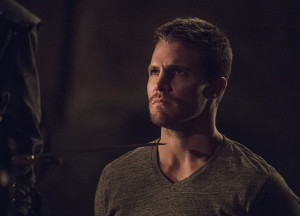 How did Season 3 compare to the first two seasons of the series?
How did Season 3 compare to the first two seasons of the series?
MATT: Sadly, not very well. Coming off the high from last season, it was hard to know what to expect out of Season 3. There were some basic ideas floating about but Season 2 had tied up quite a number of threads that there wasn’t a clear direction for where the show would go. As a result, the cohesion and direction was just not very solid, especially when held up against Season 2. Season 1 benefited from the philosophy of go, go, go, don’t hold back that has served the series more or less well from the start. It helped it to overcome some clear water-testing in the first half of the year to find out just what the show was and put that to good use in the second half of the season. Season 3 actually felt like not just a return to that stumbling in the dark but an exponential increase of it.
DEREK: Season 2 is still the pinnacle of the show, so the succeeding season an incredibly high bar to meet. Season 3 probably falls below the unevenness of season 1, too, just because the back half of that first season was such a revelation. On the whole, season 3 seemed to be trying to evolve into something new, but found those elements trapped by the constraints of the first two seasons’ structure — the flashbacks, the midseason cliffhanger, not fully introducing the Big Bad until the midway point, etc. What resulted was a halting of the fluidity and organic maturation the show was known for in favor of an overly mechanical narrative, which seemed built only to hit very specific points. Oliver had to face-off with Ra’s; Laurel had to become Black Canary; Oliver and Felicity had to get together; The Flash needed to cross over. All things that are a fine framework for the season, but instead of aiming the characters in those directions and seeing where they went, there was a feeling of “this needs to happen so that other thing can happen.” You get a lot of people flip-flopping or acting out of character in order to get the pieces where they need to be — pretty much everything related to how people act with Malcolm, for example — and random events like “Thea killing Sara” end up falling flat because they’re only there to progress the plot. The first two seasons certainly did that, but the extent to which season 3 did it sticks out. Things rang false more times than not, when the first two seasons had a knack for making satisfying decisions.
CRAIG: The notion that Season 3 has to be compared to previous seasons of Arrow is, in some ways, its downfall, as Arrow Season 2 was one of my favorite seasons of any TV show, ever. It did a lot of things right that I felt were missing here: We had an anchor between the present day villainy and the flashbacks, as both involved Slade Wilson; Slade was a foe that was actually scary. Team Arrow had grown into something quite good, and there were some twists, turns, and shocks that left me at the edge my seat during that second season.
Which isn’t to say Season 3 didn’t have its shocks: It did, but in some cases the “shocks” either fell flat (Ra’s wants Oliver to succeed him!) or we knew how it would ultimately end anyway (Oliver is alive). Like Derek, I did notice the season aimed at hitting certain points, but in Season 2, it happened more organically.
To compare to the first season…. it feels like such a different show, so it is hard to compare the two. I often lump that last third of Season 1 (from Episode 14-on) with Season 2, and tend to have glossed over that first half of the season, so I’m not sure I can give a fully honest comparison opinion. We didn’t know the characters then; we do now. It just was a different show.
I do feel Arrow Season 2 was also Oliver Queen at his most heroic, and leaving his friends in the dark about his plans seemed to regress him rather than make him better. Hopefully, though, he learned from this experience and will be a better hero in Season 4.
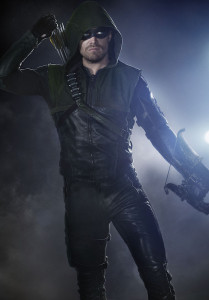 STEPHANIE: I stand by my assessment during the first season three roundtable. This season finished its run as one that was more solid than the first season, but less than the second. The visual appearance of the season, the costumes, and the week-to-week stunts were highly impressive and brought the show up to a new level, but the overall story wasn’t nearly as flashy. It felt as if they were building to moments that never really happened and trying too hard to end each episode with a cliffhanger, or at least throw a major shock in there, but they came off as contrived and inorganic. Don’t get me wrong, I still enjoyed watching the season as always. I just hoped for more enjoyment.
STEPHANIE: I stand by my assessment during the first season three roundtable. This season finished its run as one that was more solid than the first season, but less than the second. The visual appearance of the season, the costumes, and the week-to-week stunts were highly impressive and brought the show up to a new level, but the overall story wasn’t nearly as flashy. It felt as if they were building to moments that never really happened and trying too hard to end each episode with a cliffhanger, or at least throw a major shock in there, but they came off as contrived and inorganic. Don’t get me wrong, I still enjoyed watching the season as always. I just hoped for more enjoyment.
LAUREL: Overall, I’d say season 3 was the weakest of the three. There were a few episodes that didn’t quite work, and some of the plots didn’t seem to have the right timing. That said, seasons 1 and 2 were very, very good, so even a reduction in quality still left a good show.
